Milk contains several vitamins and minerals that are essential to health. The United States Department of Agriculture (USDA) states that those who consume milk and milk products have a reduced risk of lower bone mass throughout life. Along with calcium, which is responsible for the bone mass benefits, there are other vitamins and minerals that benefit the body.
Calcium, Potassium and Minerals
Calcium keeps bones strong and helps prevent osteoporosis (bone loss), which is especially important to women as the reach menopause. According to the National Institutes of Health's Office of Dietary Supplements, an increased calcium intake can also lower blood pressure, and there is a possible link between calcium intake and the prevention of prostate cancer. According to Nutrition Data, a website that provides nutrition information from the USDA, 1 cup of 2 percent milk contains 286 mg of calcium, which is 29 percent of the recommended daily value (DV).
That 1 cup serving of milk also contains 366 mg of potassium, or 10 percent of the DV. Potassium is a mineral that also helps regulate blood pressure and heart function, and can help with the absorption of calcium. Magnesium is another mineral that must be present for proper calcium absorption, and 1 cup of milk contains 26.8 mg, or 7 percent of the DV. Other minerals in milk are phosphorous, sodium, iron, copper, zinc, fluoride and selenium.
Vitamins
Milk is also loaded with vitamins needed by the body.The B vitamins are available in milk, with riboflavin at .5 mg per 1 cup serving, which is 27 percent of the DV. Other B vitamins include thiamin, niacin, B6, folate, B12, pantothenic acid and choline. According to a report published by the "Journal of Biological Chemistry," all of the B vitamins are necessary for the proper metabolism of food. There are also trace amounts of vitamins C and A, and a most milk is also fortified with vitamin D. The USDA reports that vitamin D is necessary to regulate the levels of phosphorous and calcium in the body, both of which are also in milk. It also is necessary for the proper absorption of calcium.
Protein, Carbohydrates and Fat
Milk is also an excellent source of protein. One cup provides 8.1 g, which is 16 percent of the DV. Along with protein, milk provides carbohydrates for energy, yet it can be enjoyed by those on a low-carb diet, as there are only 12 g of carbs in a 1 cup serving. The one ingredient in milk most do not want to acknowledge is fat. Fat is needed in small amounts in the body for proper functioning of cells, but at the same time it can lower the levels of LDL (bad) cholesterol. For this reason, the USDA recommends consuming milk that is lower in fat. Choosing milk products that are 2 percent fat, or less, will greatly cut down the fat intake from milk. The amount of fat in the milk, will depend upon what percentage you choose to consume.
Related Articles

Can I Dilute Whipping Cream to Sub Milk?

How Long Can Milk Stay Unrefrigerated?

Milk Protein for Skin Care
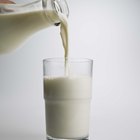
Whole Milk Vs. Lactaid Milk

What Is the Nutritional Value of Wheat?

Difference Between Fermented Milk & ...
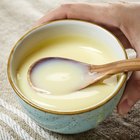
How to Thicken Condensed Milk
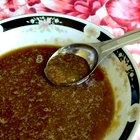
Milk Mask and Acne
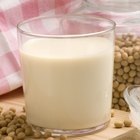
Is Soy Milk Casein-Free?
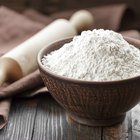
Nutrition Information for All-Purpose ...

Can You Drink Milk That Expires the ...

Side Effects of Certain Dri

Cappuccino Nutrition Information

Cold Milk for Weight Loss

Bodybuilding and Losing Fat With Skim ...

Does Milk Thistle Lower Liver Enzymes?

Can I Use Milk Instead of Heavy Cream ...

Milk of Magnesia Treatment for Acne
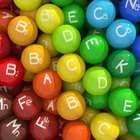
What Vitamins Help the Liver?

Vitamins for Mental Alertness
References
Writer Bio
A certified nutritionist who majored in health, fitness and nutrition, Traci Vandermark has been writing articles in her specialty fields since 1998. Her articles have appeared both online and in print for publications such as Simple Abundance, "Catskill Country Magazine," "Birds and Blooms," "Cappers" and "Country Discoveries."